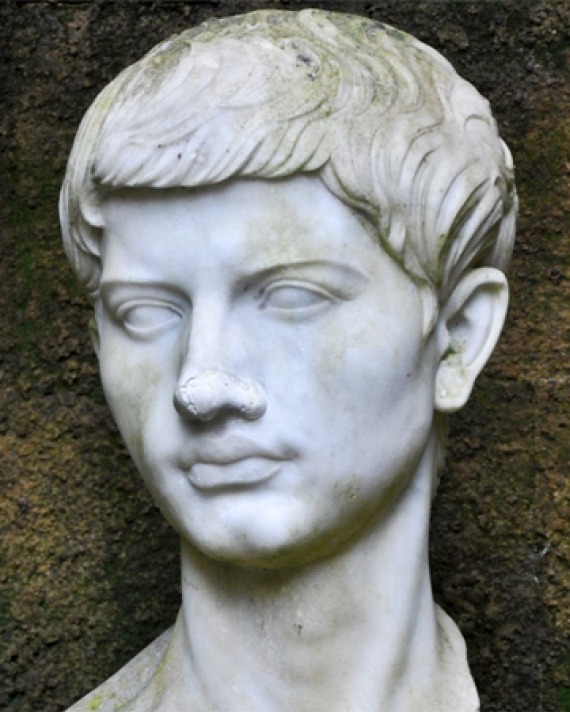 I came across author Ursula K. LeGuin years ago when I found A Wizard of Earthsea. The miniseries, that is, not the book. I did a little research when I found out it was based on a book, but I never stopped to read it. I think it's been on my to be read shelf for fifteen years. I'm gonna have to read that eventually. Either way, when I saw Lavinia, I recognized Le Guin's name, but thought she had only written science fiction.
I came across author Ursula K. LeGuin years ago when I found A Wizard of Earthsea. The miniseries, that is, not the book. I did a little research when I found out it was based on a book, but I never stopped to read it. I think it's been on my to be read shelf for fifteen years. I'm gonna have to read that eventually. Either way, when I saw Lavinia, I recognized Le Guin's name, but thought she had only written science fiction.I was wrong, and Lavinia is absolutely amazing.
Today you might hear the Lavinia and think of Matthew's ill-fated romance in season 2 of Downton Abbey with Lavinia Swire. The name is much, much older than the early 20th century. It is the female version of Latinus. Mythology's Lavinia is the only living child of Latinus, King of the Latins, and his wife Amata. She is the last wife of Aeneas, and considered to be the Mother of the Roman people. Her story is begun in the poet Virgil's Aeneid, but it's left unfinished. Lavinia, for all the powerful figure that she is, never speaks. LeGuin gives Lavinia a voice, and her story is beautiful.
 We meet Lavinia first as a young girl. She connects more with her father, King Latinus, than her mother, Queen Amata, but Amata's tragedy was to lose two sons as children. She's unstable to say the least, and Lavina flat out calls her mad. Either way, she's about to make some bad choices that steer to course of her whole family. Lavinia, as her father's daughter, helps with the religious ceremonies that surround their everyday life. He takes her a place of pilgrimage and oracles called Albunea, where Latinus has heard the prophecies of Father Tiber and the other gods before. Something in that place calls to Lavinia and she visits many times over the course of the book. It's here that she meets "the poet", a shade of a dying Virgil (right) who laments that he did not truly tell Lavinia's story. Through him Lavinia learns of her fate to marry Aeneas, who left Troy in the aftermath of the war and is destined to start a great civilization.
We meet Lavinia first as a young girl. She connects more with her father, King Latinus, than her mother, Queen Amata, but Amata's tragedy was to lose two sons as children. She's unstable to say the least, and Lavina flat out calls her mad. Either way, she's about to make some bad choices that steer to course of her whole family. Lavinia, as her father's daughter, helps with the religious ceremonies that surround their everyday life. He takes her a place of pilgrimage and oracles called Albunea, where Latinus has heard the prophecies of Father Tiber and the other gods before. Something in that place calls to Lavinia and she visits many times over the course of the book. It's here that she meets "the poet", a shade of a dying Virgil (right) who laments that he did not truly tell Lavinia's story. Through him Lavinia learns of her fate to marry Aeneas, who left Troy in the aftermath of the war and is destined to start a great civilization.Eventually, Lavinia is of a marriageable age and suitors begin coming to court her and her parents. The most persistent of these is her cousin Turnus. Turnus is king of the Rutili, but something in him sets Lavinia on edge. Turnus and Lavinia's other suitors propose a Helen of Sparta-esque treaty in order to have Latinus select one of them to be Lavinia's husband, but she convinces her father to take a trip to Albunea with her before deciding on her husband. While there, Latinus has a dream that he takes as prophecy--Lavinia is to have no Latin husband. He sticks truthfully to this prophecy, and a few months later Aeneas and his Trojans land on the beaches of Lavinia's home. Latinus offers Aeneas Lavinia as a bride, and peace is struck.
Except for Turnus, who, at the prompting of his aunt, Amata, declares war on Aeneas. It is a brutal, vicious fight with peace declared twice and broken twice thanks to Turnus. At one point, during a ritutal, flames appear on Lavinia's head, which is seen as a good omen. Aeneas offers to end the war by fighting Turnus one on one, but Turnus keeps disappearing. They eventually meet, and Turnus is defeated. This is where Virgil's account ends.
Lavinia and Aeneas are wed, and the next bit of the book tells of their lives together. Although their are a few difficulties, mostly from Aeneas' Trojan son Ascanius, they have a nearly idyllic three years together, as the poet predicted to Lavinia. He is taken from her three years to the day after their wedding. Ascanius becomes co-King of the Latins with Latinus, and chooses not to rule from the city of Lavinium, which Aeneas built and named for his wife. Lavina tries to help Ascanius, but he is a different man from his father. She instead devotes her time to her son, Silvius, who will become the ruling king of the Latins, even going so far as to retreat with him into "exile" in the woods. She shows that she is not afraid of the wood by saying that she will call the wolf "brother" if he comes after her, and her people call her "Wolf Mother". This reads as an allusion to the myth of Romulus and Remus, her descendant through Silvius, who would be raised by a She-wolf and found the mighty city of Rome.
This book is not broken into chapters in a way that a reader might expect, but is told as stream of consciousness. This was odd when I was reading it, but a clever play. I didn't want to put the book down, and not having traditional chapter breaks made it easier to tell myself one more page! I just finished the book, and I'm already looking forward to rereading it. I feel like this is one of those books where you find more and more layers the more you read. It not only tells Lavinia's story, but blends in beautiful historical aspects to teach the reader about daily life, warfare, and religion in a time over a thousand years before Christ and the incredible might of the Roman Empire.
#lavinia #aeneas #virgil #aeneid #latinus #turnus #ascanius #silvius #rome #latins #amata #thepoet #epic #ursulakleguin #heroes #albunea #history #herstory #silentinthepoem #inhervoice #unfinished #readabook #queenvicsbookshelf


No comments:
Post a Comment